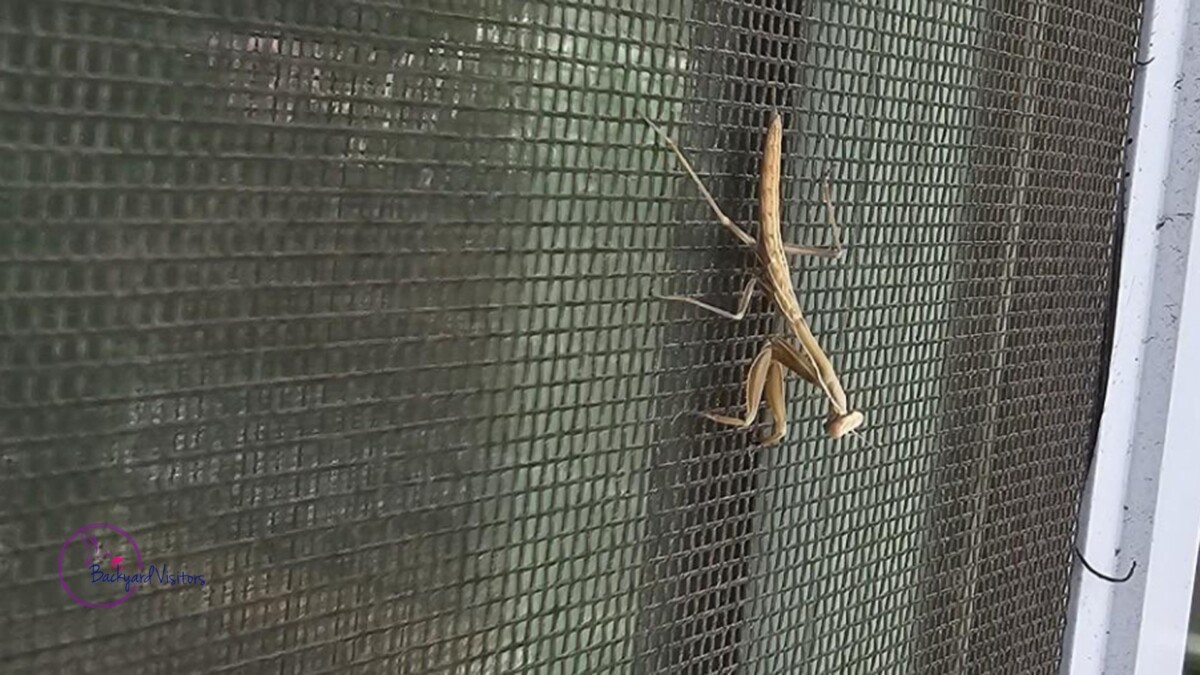This post contains affiliate links.
Recently, my brother saw several praying mantises in his backyard and asked me if they were dangerous to his hummingbirds.
To my great surprise, I discovered that the Praying Mantis is a major threat to hummingbirds. I wondered how many other insects are dangerous as well.
This article identifies several insects that prey on hummingbirds.
What Insects Eat Hummingbirds?
Insects that eat hummingbirds include:
- Praying Mantis
- Spiders
- Dragonflies
- Robber Flies
- Giant Hornets
- Red Velvet Ants
- Assassin Bugs
Do Praying Mantises Eat Hummingbirds?
The praying mantis is the second-most common hummingbird predator, only behind cats, and is the top insect predator to consume hummingbirds. They are carnivorous insects that primarily feed on other insects; however, if given the chance, they will target and eat larger prey.
Praying mantises are opportunistic predators known to wait at feeders or hide in the bushes and wait to ambush and attack a hummingbird.
Since praying mantises are considered beneficial insects, it is inconceivable to believe that they would attack and eat a hummingbird; and yet they do!
The behavior of praying mantises can vary depending on the species, size, and availability of prey.
Praying mantises become aggressive and bold when they are hungry. They have been documented to wait patiently and cling underneath hummingbird feeders anticipating to surprise and catch a hummingbird to eat.
The praying mantis can look like a leave or branch by staying completely still and is able to camouflage well in their surroundings making it easier for them to attack a hummingbird that is caught off guard while resting on a feeder.
The praying mantises will capture and consume various parts of the hummingbird, including the head, body, or other portions.
They are equipped with sharp spiky forelegs called raptorial legs that they use to grasp, pin down and immobilize their prey. They then use their strong mandibles, moving their jaws in a slanted sideways motion, to cut or tear their food before consuming.
It sounds gruesome, I know!
Here is something even more gruesome:
After mating, the female praying mantis bites the male’s head off!
The conundrum if you see a praying mantis in your yard, is whether to keep it or kill it. The most humane thing to do is relocate it so that you can glean the benefits of its ability to decrease your pest population and have less of an opportunity to attack your fair-feathered friends.

Early on, after molting, they can be brown rather than the traditional green that is expected.

Head down, tail up.
The broader tail suggests this is a female.
Do Spiders Eat Hummingbirds?
Spiders will eat hummingbirds when they get entangled in a robust spider web however it is not the intent of most spiders to catch a hummingbird and is not a common occurrence. An exception to this is the jumping spider.
Spiders are known to catch and consume small birds, including hummingbirds if they become entangled in their webs.
Jumping spiders have been documented trying to kill baby hummingbirds.
Spiders are arthropods, a class of Arachnida most known as insects.
Their spider web targets insects but occasionally the web captures a hummingbird.
Female hummingbirds gather spider web silk when building a nest and during that process sometimes becomes stuck in a heavy strong web.
A male hummingbird may be escaping a chase and inadvertently get caught in a spider’s web and have difficulty disentangling from it.
When a hummingbird gets entrapped in the web, the spider is notified by the vibrations caused by the captured prey. It moves quickly towards its victim and initially immobilizes it with a venom then wraps the hummingbird in silk to keep it from moving. At a later time, when the spider is hungry, it will leisurely consume it.
Some big spiders like the golden silk orb-weaver and the tropical orb-weaver are known to catch hummingbirds in their webs.
In the best-case scenario, the female hummingbird raids the spider of its web escaping victimhood, and is able to use the silk to glue her nest.
Normally, both the male and female hummingbirds are able to break free of a spiderweb without being harmed due to their strength and incredibly agile maneuvers.
On the other hand, if the spider’s web is well built, strong, and sturdy, and the spider is quick in responding, a hummingbird can be captured and may perish.
Do Dragonflies Eat Hummingbirds?
Dragonflies can eat hummingbirds, although it is extremely rare.
There is conflicting information about whether dragonflies eat hummingbirds.
Dragonflies are not known to aggressively pursue or kill hummingbirds as prey but it may happen occasionally.
A dragonfly eating a hummingbird has been documented however, it is unclear if the dragonfly killed the hummingbird or if it was already dead.
Dragonflies are not afraid of hummingbirds, however, hummingbirds appear to be bothered or frightened by dragonflies in their presence.
Whether or not hummingbirds are afraid of dragonflies cannot be answered with certainty. It is dependent on the particular dragonfly and hummingbird species involved.
The most likely dragonfly offenders are green darners and dragon hunters.
In general, dragonflies do not have a reputation for attacking or killing hummingbirds and are unlikely to harm them unless they are protecting their territory or feel provoked or threatened in some way.
Check out my other posts on Hummingbird Questions
Happy Safe Humminbird Watching!
Backyard Visitors participates in affiliate programs which compensate us for referring traffic.

